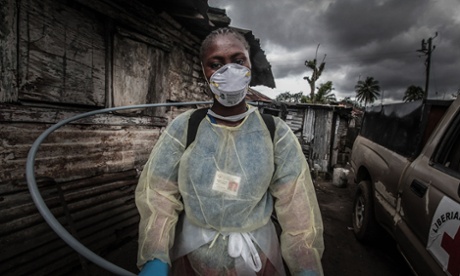AMA accuses government of having its ‘head in the sand’ but PM says other countries have yet to commit to assist in evacuations of Australians

Tony Abbott is holding firm against calls to send Australian medical experts to west Africa to help contain the Ebola virus, saying that other countries have yet to give firm commitments to assist in evacuations.
The opposition renewed its calls for the prime minister to deploy medical teams to the region to help prevent the spread of Ebola, which has killed more than 4,500 people.
Labor’s foreign affairs spokeswoman, Tanya Plibersek, said it was “beyond belief” that the Australian government was not able to negotiate with the US or European countries to provide assurances for Australian medical staff should they need to be evacuated.
The Australian Medical Association (AMA) has called on the government to review the nation’s preparedness to deal with Ebola cases, amid concerns about the second positive test in the US.
“The last thing we want to do is to make people panic or fearful but I think we need to have a very considered approach in terms of Australia’s role in treating this particular problem and its global response,” said the AMA president, Brian Owler.
“I don’t think it is the time to put our heads in the sand and suggest that Australia should shut its doors and just pretend the problem is a west African problem and let other nations handle the problem by themselves.”
It is understood Australian diplomatic officials have been talking “for several weeks” with other countries, including the US, UK and EU member states, seeking guaranteed assistance in the event an Australian sent to west Africa was infected.
Officials are concerned that an airlift back to Australia could take at least 30 hours, during which time the person could die, and a more suitable arrangement would be an evacuation to a closer country.
The government would require an “ironclad guarantee” from a partner country that an Australian requiring treatment, regardless of condition, would be flown there and receive treatment.
A general statement that a country would endeavour to help was inadequate, diplomatic officials said. Despite public statements from world leaders about the need to confront Ebola, no country had yet given an unequivocal guarantee to satisfy Australia’s conditions.
In some cases obstacles included those countries’ immigration constraints. Australian officials believe countries are focused on processes to repatriate their own citizens first and that their acceptance of infected non-nationals could set a precedent for others.
Australian Defence Force (ADF) officials have expressed concern about the risk to people sent to west Africa, given that the Ebola virus had a death rate of up to 70% of people infected. It is believed the ADF has no portable isolation units.
Plibersek and the opposition’s health spokeswoman, Catherine King, wrote to ministers on Thursday saying Australia could not afford to keep standing by as the world confronted “the most serious health emergency of the modern era”.
The letter said the government should make “immediate arrangements” to deploy Australian medical assistance teams and support other specialist Australian personnel such as doctors and nurses.
In a media conference, Plibersek said: “It is certainly not beyond the ability of the Australian government to organise evacuation protocols for any Australians who may become infected with Ebola, if Australians should go to the assistance of the west African nations who are most affected … The worst-case scenario for Australia is an unchecked Ebola virus that spreads beyond the west African countries that are affected now, to become a global problem.”
Abbott said Australia had provided $18m to the efforts in west Africa, on top of the $40m annual contribution to the World Health Organisation, and was “focused on being prepared here at home and in our region”.
“I have to say that at the moment, we are focused on ensuring that our hospitals here in Australia are well-prepared to receive any Ebola patients should they get here,” the prime minister said.
“What I am very reluctant to do is to direct Australian personnel into Ebola hot spots when we don’t have any means of effectively evacuating such personnel back to Australia and we have no commitments from other countries to treat them there either.
“I think it would be a little irresponsible of an Australian government to order Australian personnel into this very dangerous situation if we didn’t have effective risk mitigation strategies in place and at the moment there is no way of doing that.”
The AMA called on the Australian government to step in and provide assistance, saying the problem must be tackled at the source to ensure it did not spread.
Owler said he understood the government’s reluctance to send people into harm’s way and he was not calling for people to be deployed against their will, but some were willing to “do this dangerous work”.
“Unless we respond and control this with a global effort, unfortunately, the cases are going to spiral out of control,” he said.
Owler also called on Australia to review its preparedness to deal with cases here, after the second case in Texas raised the prospect that procedures and protocols had failed.
He said he was surprised that the government had not convened a meeting of experts to consider the Australia’s domestic and international response.
The health minister, Peter Dutton, said authorities were “continuing to monitor our borders” and had interviewed 700 people on arrival from west Africa.
“We have obviously had now 11 suspected cases [of Ebola], all of which have been negative after testing,” he said.
Dutton said it was “very important for Australians to understand” that Ebola spread via bodily fluids and was “not like the common flu”.
“If people are coughing and sneezing, you can easily catch the flu. Ebola is not like that,” he said.
The immigration minister, Scott Morrison, said he was “puzzled at the naivety” of Plibersek’s position. “You can’t govern on sentiment,” he told the ABC.
